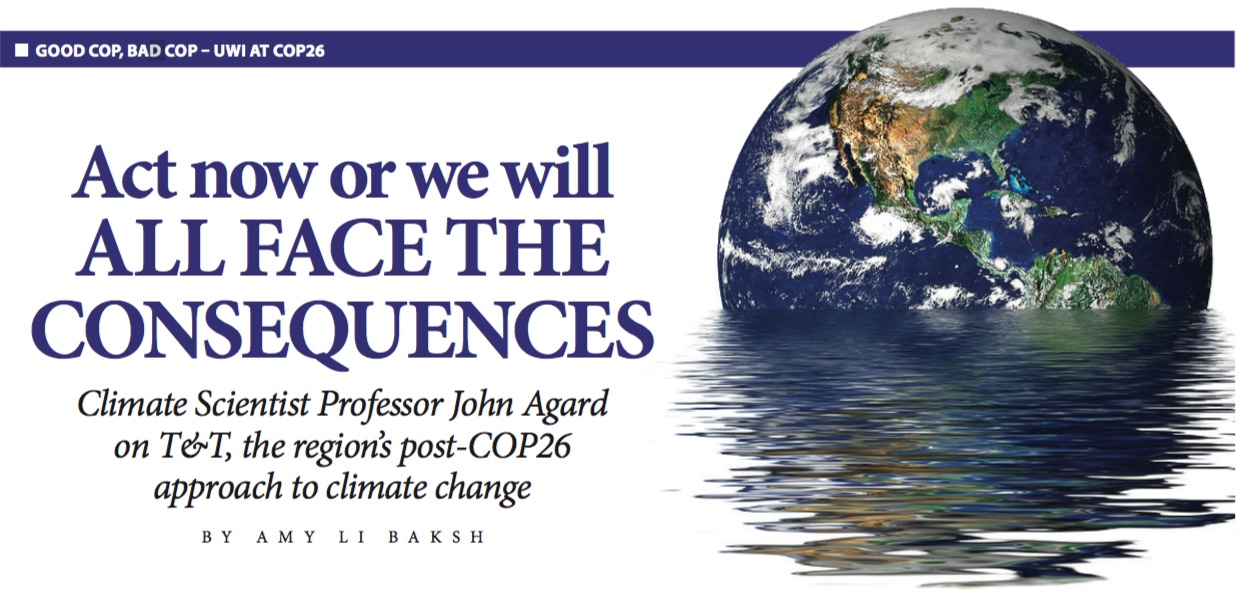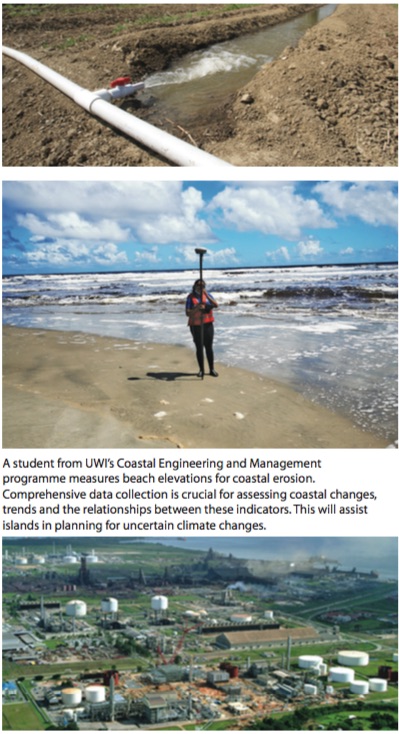
The 2021 United Nations Climate Change conference, known as COP26, was held in Glasgow from October 31 to November 13. World leaders from 120 countries and over 40,000 participants gathered to discuss the future of our planet in the face of decades of insufficient climate action. The hope was that they could curb some of the damage caused by fossil fuels, damage that is projected to have dire consequences for the environment and humanity.
Over the past few decades, carbon dioxide emissions have resulted in changes that are already having marked consequences for us in the Caribbean.
“Incredible carbon dioxide emissions are causing the world to get hotter. Not only that, but in the Caribbean, we have a hurricane season every year, and where we used to have Category Five hurricanes that were many decades apart, we are now having them every few years,” says Professor John Agard, leading scientist at UWI St Augustine, Professor of Tropical Island Ecology, and Director of the university’s Global Institute for Climate-Smart and Resilient Development.

Prof Agard was one of several academics from The UWI that took part in COP26. He attended virtually so as to not contribute to conference’s carbon footprint.
As Prime Minister of Barbados Mia Mottley stated at the conference, small island states, like those in the Caribbean, are dependent on finance to limit global temperature rise and ensure our survival. Failure to do so “is measured in lives and livelihoods in our community”.
A similar statement was echoed by Dr Keith Rowley, Prime Minister of T&T, who also noted that financing was required for countries like ours to achieve the changes needed to survive.
“As an economy largely based on oil and gas, and petrochemicals, we in Trinidad and Tobago recognise our responsibility in transitioning, over a reasonable and manageable time, to net zero,” said Dr Rowley. But will it be enough?
“We are dependent on getting enormous foreign exchange from oil and gas,” Prof Agard tells UWI TODAY. “Because of the climate change issue of people trying to get into renewable energy, that’s not going to happen anytime soon in Trinidad and Tobago. So we need to develop a zero energy transition plan and roadmap, to see when we are going to exit from oil and gas, as many other countries have done.”
Currently underway is the Orange Grove Solar Park, where The UWI has provided land to create a 40-hectare solar panel park at the Orange Grove Estate. According to the Prime Minister, that project would produce 10 per cent of renewable energy in T&T, which would be the biggest project of that kind in the Caribbean. However, those are suggestions, and a concrete plan is needed. Production of windmill farms in Jamaica have drastically reduced their CO2 emissions.
“Other countries are making progress in generating energy from other sources rather than buying oil and gas from Trinidad and Tobago. The market is being reduced. We are at risk of being left behind because we produce the oil and gas,” says Prof Agard.
It is all well and good to discuss the possibilities of what can be done, but without real action, these are simply words. Already, the Caribbean is feeling the effects of climate change and will continue to do so as it becomes more rapid. Even those who are more focused on the economics over the environment should be concerned because it will also have a tremendous effect on markets.
“Trinidad and Tobago is slipping into the hurricane zone because of heat development,” says the climate scientist. “We have massive infrastructure not only in rigs offshore, but also at Pt Lisas, and those companies are close to each other. There could be enormous destruction in Trinidad and Tobago, and years of GDP could be lost in hours.”
The government of T&T has opened up proposals for projects for generating renewable energy, and more than 60 companies submitted proposals. They chose a solar panel project that The UWI is involved in.
“But there were many other proposals. Some others involved putting up massive windmills on the East Coast, because there’s wind coming in across the Atlantic, and there’s no land between here and Africa. So you could generate electricity this way,” says Prof Agard. “I think they will have to reopen the invitation proposals so we can have several projects going at the same time.”
With sea level rise causing coastal erosion, and heat index rise affecting our wet and dry seasons and our overall ability to work and be outside, we need more than ever to push our leaders to make more meaningful change.

Prof Agard believes that “the voices of young people in particular are important. We have new tools that did not exist before, like social media, and those in leadership roles pay attention to them because information travels globally in real time. This is the avenue that young people use to have their voices heard globally.”
And our voices are more important than ever— but ultimately, the most important thing right now is action.